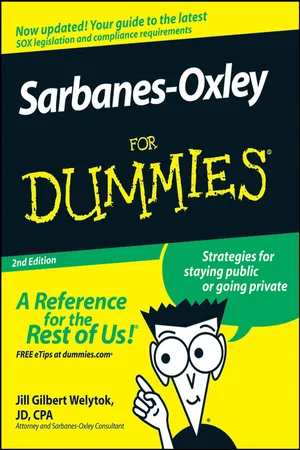
- English
- ePUB (mobile friendly)
- Available on iOS & Android
Sarbanes-Oxley For Dummies
About this book
You may not believe that there's a fun and easy way to comply with Sarbanes –Oxley, but once you have Sarbanes-Oxley For Dummies, Second Edition in front of you, you're sure to change your mind. This friendly guide gets you quickly up to speed with the latest SOX legislation and shows you safe and effective ways to reduce compliance costs.
In plain English, this completely reliable handbook walks you through the new and revised SOX laws, introduces compliance strategies for changed and unchanged guidelines, and gives you an effective framework for implementation You'll find out how to create an efficient audit committee, purchase and use SOX software solutions, and make practical, cost-effective decisions in your initial compliance year and beyond. You'll also find proven strategies for staying public or going private and learn how to deal with all those SOX forms. Discover how to:
- Establish SOX standards for IT professionals
- Minimize compliance costs in every area of your company
- Survive a section 404 audit
- Avoid litigation under SOX
- Anticipate future rules and trends
- Create a post-SOX paper trail
- Bolster your company's standing and reputation
- Work with SOX in a small business
- Meet new SOX standards
- Build a board that can't be bought
- Comply with all SOX management mandates
Complete with invaluable tips on how to form an effective audit committee, Sarbanes-Oxley For Dummies is the resource you need to keep your SOX clean.
Tools to learn more effectively

Saving Books

Keyword Search

Annotating Text

Listen to it instead
Information
Part I
The Scene Before and After SOX

Chapter 1
The SOX Saga
In This Chapter




Plowing Through the Politics of SOX


Taking advantage of a loophole





Not everyone’s a SOX fan
Table of contents
- Title
- Contents
- Introduction
- Part I : The Scene Before and After SOX
- Part II : SOX in the City: Meeting New Standards
- Part III : Scaling Down Section 404
- Part IV : SOX for Techies
- Part V : To SOX-finity and Beyond
- Part VI : The Part of Tens
- Part VII : Appendixes
- : Further Reading
Frequently asked questions
- Essential is ideal for learners and professionals who enjoy exploring a wide range of subjects. Access the Essential Library with 800,000+ trusted titles and best-sellers across business, personal growth, and the humanities. Includes unlimited reading time and Standard Read Aloud voice.
- Complete: Perfect for advanced learners and researchers needing full, unrestricted access. Unlock 1.4M+ books across hundreds of subjects, including academic and specialized titles. The Complete Plan also includes advanced features like Premium Read Aloud and Research Assistant.
Please note we cannot support devices running on iOS 13 and Android 7 or earlier. Learn more about using the app